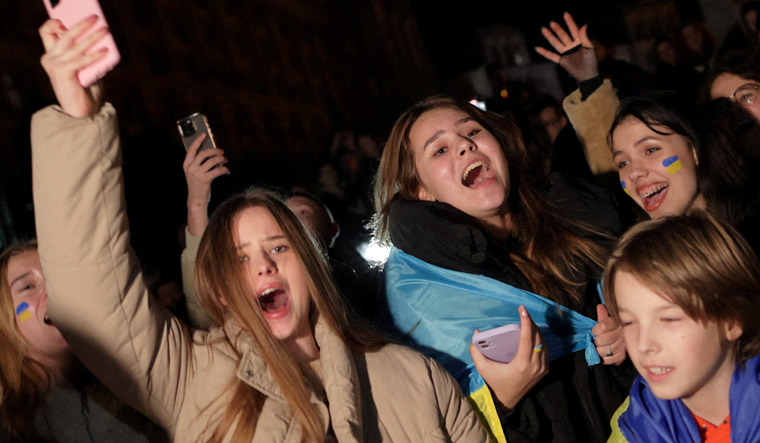The Ukrainian military carried out stabilisation measures near the southern city of Kherson on Saturday following the end of an eight-month occupation by Russian forces, a retreat that cast a further pall on President Vladimir Putin's designs to take over large parts of Ukraine.
Residents of Kherson, the only regional capital captured by Russia's military during the ongoing invasion, awoke from a night of jubilant celebrating that broke out in the city and surrounding areas after the Kremlin announced its troops had withdrawn to the other side of the Dnieper River.
In a regular social media update Saturday, the General Staff of Ukraine's armed forces said the Russians were fortifying their battle lines on the river's eastern bank after abandoning the capital. About 70 per cent of the Kherson region remains under Russian control.
Ukrainian officials from President Volodymyr Zelenskyy on down cautioned that while special military units had reached Kherson city, a full deployment to reinforce the advance troops still was underway. On Friday, Ukraine's intelligence agency said it thought some Russian soldiers stayed behind, ditching their uniforms for civilian clothes to avoid detection.
“Even when the city is not yet completely cleansed of the enemy's presence, the people of Kherson themselves are already removing Russian symbols and any traces of the occupiers' stay in Kherson from the streets and buildings,” Zelenskyy said in his nightly video address late Friday.
Photos circulating Saturday on social media showed Ukrainian activists removing memorial plaques put up by the occupation authorities the Kremlin installed to run the Kherson region. A Telegram post on the channel of Yellow Ribbon, a self-described Ukrainian public resistance movement, showed two people in a park taking down plaques picturing what appeared to be Soviet-era military figures.
Moscow's announcement that Russian forces planned to withdraw across the Dnieper River, which divides both the Kherson region and Ukraine, followed a stepped-up Ukrainian counteroffensive in the country's south.
In the last two months, Ukraine's military claimed to have reclaimed dozens of towns and villages north of Kherson city, and the Ukrainian General Staff said that's where the stabilization activities were taking place.
The Russian retreat represented a significant setback for the Kremlin some six weeks after Putin annexed the Kherson region and three other provinces in southern and eastern Ukraine in breach of international law and the face of widespread condemnation. The Russian leader unequivocally asserted the illegally claimed areas as Russian territory.
Russian state news agency TASS quoted an official in Kherson's Kremlin-appointed administration on Saturday as saying that Henichesk, a city on the Azov Sea some 200 kilometres southeast of Kherson city, would serve as the region's temporary capital after the withdrawal across the Dnieper.
Ukrainian media derided the announcement, with the daily newspaper Ukrainskaya Pravda saying Russia had made up a new capital for the region.
Like Zelenskyy, Ukrainian Foreign Minister Dmytro Kuleba sought to temper the excitement over the invaded nation's latest morale boost. “We are winning battles on the ground, but the war continues," he said from Cambodia, where he was attending a meeting of the Association of Southeast Asian Nations.
Kuleba also brought up the prospect of the Ukrainian army finding evidence of possible Russian war crimes in Kherson, just as it did after the Russian Defence Ministry pulled back its forces in the Kyiv and Kharkiv regions earlier in the way.
“Every time we liberate a piece of our territory, when we enter a city liberated from the Russian army, we find torture rooms and mass graves with civilians tortured and murdered by Russian army in the course of the occupation of these territories," Ukraine's top diplomat said. "It's not easy to speak with people like this. But I said that every war ends with diplomacy and Russia has to approach talks in good faith.”
US assessments this week showed Russia's war in Ukraine may already have killed or wounded tens of thousands of civilians and hundreds of thousands of soldiers.
While much of the focus was on southern Ukraine, Russia continued its grinding offensive in Ukraine's industrial east, targeting, in particular, the Donetsk region city of Bakhmut, the Donetsk region, the Ukrainian General Staff said.
Donetsk Governor Pavlo Kyrylenko reported Saturday that two civilians were killed and four wounded over the last day as battles heated up around Bakhmut and Avdiivka, a small city that has remained in Ukrainian hands throughout the war.



